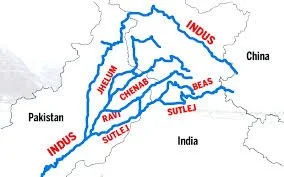Indus Waters Treaty: Why has govt not moved UN or ICJ yet?
More than a month after India announced its unilateral suspension of the treaty, Pakistan has yet to take the matter to any international forum, raising questions about the govt’s priorities
SITUATIONER
May 24, 2025
IT was Wednesday, the 23rd of April, when India announced its decision to place the Indus Waters Treaty (IWT) “under abeyance” — a move that is not sanctioned by the terms of the international accord. In plain terms, 31 days have passed since India declared its intention to effectively suspend a treaty that has long served as a stabilising framework between the two nuclear-armed neighbours. While India currently lacks the infrastructure to prevent the flow of water into Pakistan, its declaration nonetheless signals a disturbing shift — one that could amount to collective punishment against the Pakistani population.
Yet Islamabad has made no formal approach to any international forum to seek redress or resolution. Prime Minister Shehbaz Sharif and members of his cabinet have rightly described Narendra Modi’s actions as an “act of war”, but beyond these strong words the government’s practical response has been minimal.
Media reports suggest that a legal strategy committee has been formed to advise the federal government on the issue, but little tangible progress has followed. According to sources, the institutions being considered for legal action include the World Bank — the original facilitator of the 1960 treaty. The IWT has famously withstood three major military confrontations between Pakistan and India. Whether it can survive the current impasse remains uncertain, however.
Pakistan is also reportedly exploring the possibility of initiating legal proceedings at the Permanent Court of Arbitration and the International Court of Justice (ICJ), arguing that India’s unilateral action constitutes a breach of the 1969 Vienna Convention on the Law of Treaties. Another option being weighed is bringing the issue before the United Nations Security Council to highlight its broader geopolitical and humanitarian implications.
On the domestic front, the National Security Committee, chaired by the prime minister, has categorically rejected the legality of India’s move. The committee has reiterated that the IWT is a binding international agreement, with no provision for unilateral suspension. It further asserted that any attempt to divert or stop water flows would be treated as an act of aggression.
Having listed the possible courses of action, this reporter must ask: Why, after more than a month, has the government not approached any of the international forums that could potentially provide Islamabad with legal or diplomatic relief?
Is it because Pakistan’s civil and military leadership has been preoccupied with addressing the strategic dimensions of India’s provocative declarations of April 23? Perhaps — but matters involved in IWT fall under the remit of competent legal experts and diplomats, not defence officials. There is no reason why the necessary legal groundwork could not have proceeded in parallel with work involved in military preparedness and engagement.
Another possible explanation for the delay lies in a misguided assumption within Pakistani officialdom — that the dispute might be addressed through bilateral talks. However, this seems naïve at best and delusional at worst.
This reporter contends that India would want to avoid any meaningful negotiations at this time. And even if talks were initiated, they would likely end before producing any substantive outcome. Consider the example of the Kashmir issue — a subject of negotiations for decades, which yielded little beyond diplomatic photo-ops and extensive travel budgets.
In 2019, India unilaterally revoked the special status of Jammu and Kashmir, effectively absorbing and usurping the disputed territory. Neither Pakistan nor the United Nations could do anything of consequence to stop it.
In this writer’s assessment, New Delhi’s current policy stems from a deep-seated frustration over its inability to overpower Pakistan militarily in recent confrontations. Prime Minister Modi and his party appear to be in no mood to offer even the semblance of conciliation before the upcoming Bihar elections (scheduled for October or November) have concluded.
Modi is the kind of politician who is more concerned with electoral gains than building a statesman-like legacy. What sort of a legacy can a leader who threatens to deprive an entire nation of water be expected to leave behind?
